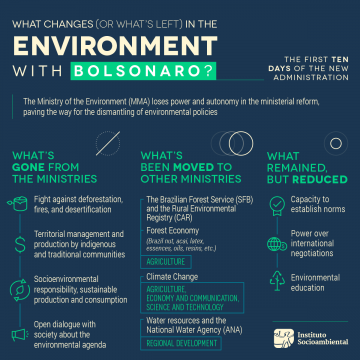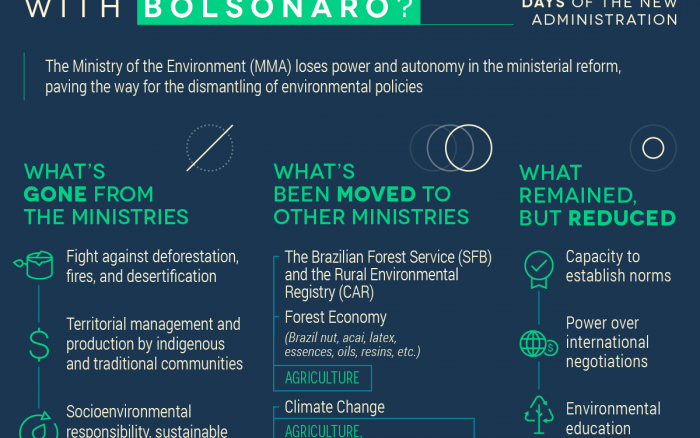Você está na versão anterior do website do ISA
Atenção
Essa é a versão antiga do site do ISA que ficou no ar até março de 2022. As informações institucionais aqui contidas podem estar desatualizadas. Acesse https://www.socioambiental.org para a versão atual.
What changes (or what’s left) in the Brazilian environmental agenda with president Bolsonaro’s reforms?
Friday, 18 de January de 2019 
Esta notícia está associada ao Programa:
A close look at the ministerial restructuring by the ISA team reveals a smothering of influence and autonomy of the environmental agenda in Brazil. See how the main areas and policies will be
One of Jair Bolsonaro’s most famous phrases is that the goal of his government would be to make Brazil similar to what it was “40 or 50 years ago”. Only eight days after taking office, we can’t say for sure whether his promise will be accomplished. But there are signs that the pathway has been cleared when it comes to the environment.
The ISA team took a close look at the Provisional Measure (MP) and decrees that during the first days of the new government changed the formal attributions of the ministries, producing the most drastic restructuring of top-level government agencies since the Collor administration (1990-1992). The conclusion is that socioenvironmental policies in Brazil, built up over the past 40 years through significant advances and international recognition, are now at risk. The Ministry of the Environment (MMA) not only lost political power, but is now subordinated to economic interests and other areas of the government.
“This indicates that these topics are not a priority for the government. It’s almost as if they’ve decided to terminate the MMA without the burden of actually doing so”, summarizes Nurit Bensusan, Biodiversity specialist associated to ISA.
Advisors and Bolsonaro himself have said that the ministry would be extinct, and its roles would be incorporated in Agriculture agenda. The idea was abandoned, after several retreats, due to pressure from the rural caucus itself, worried about the strain this would bring both in Brazil and worldwide.
“This may be a first sign that these policies are threatened and may disappear; or that they will be abandoned and there will be nobody to implement them”, Bensusan bets. “What’s curious is that part of these are instruments the government needs and will have to use”, she comments.
Weakening of roles
In general, the MP and decree that restructure the MMA blatantly demonstrate the weakening of its capacity to formulate and conduct policies, including the establishment of norms that guide its directives. It no longer is responsible for fighting deforestation, an issue that has been under the environmental agenda since the 1980s. The same has occurred with programs for indigenous and traditional communities.
The ministry no longer has the attribution to fight against fires and desertification. The environmental education department has also been eliminated, and these themes are now just generic mentions in the environmental agenda and the Ministry of Education. Other themes that have disappeared are environmental responsibility, sustainable production and consumption (reduction or banning of plastic bags, corporate codes of conduct, conservation credits, etc.)
The new Department of Sustainable Development has been sucked dry and no longer has its executive role, now only producing studies, data, and indicators. Water resource management policies, including the National Water Agency (ANA), has been moved to the Ministry of Regional Development.
The MMA press office informed the ISA team that there was no availability for interviews with minister [of the environment] Ricardo Salles or any other spokesperson.
Climate Change
The most strategic umbrella topic for the immediate future of the country, climate change, has practically disappeared from the MMA, with only sparse mentions in the attributions of the Ministries of Agriculture, Economy and Communication, Science and Technology. In the detailing of the structure of the MMA, there is reference only to the National Climate Change Fund and other generic mentions in the Department of Ecosystem Conservation under the Secretariat of Biodiversity.
There is no indication of who will conduct the national policy and international negotiation on climate change, a former attribution of the MMA. The other ministry responsible for climate change negotiation is Itamaraty (Ministry of Foreign Affairs). The problem is that the current minister, Ernesto Araújo, is a doubter of global warming. In practice, the Environment now has a secondary role in the diplomatic sphere.
Fight against deforestation
Between 2004 and 2012, deforestation in the Brazilian Amazon dropped 83%. This achievement was the result of implementation of the Plan of Action for the Prevention and Control of Deforestation in the Legal Amazon (PPCDAm), which gained recognition worldwide as one of the main actions to protect tropical forests and fight climate change (deforestation and fires are the biggest source of global warming in Brazil).
Researchers and technical experts heard by ISA agree that part of this success is the result of the consolidation of a ministry whose approach is integrated with different themes, which is capable of establishing an environmental agenda within ministries and federal, state, and municipal governments and coordinating actions among them. PPCDAM would be the best example of this type of articulation.
That is why the fragmentation of the new administrative layout suggests a deterioration of environmental policies. One of the most symbolic measures in this sense has been the removal of part of the attributions of the former Secretariat of Climate Change and Forests from the MMA, including the climate change agenda.
The main issue raised by specialists now is: who is going to articulate the policies whose formal attribution was taken from the MMA or was spread to other directories?
Senior researcher at the Amazon Environmental Research Institute (Ipam) Paulo Moutinho says that the new administrative layout is erroneous, especially with the separation between deforestation and climate change. “Deforestation is generated through a complex multilayered and multisectoral process. If you deal with the issue in a compartmentalized manner, as seems to be the intention of this government, you lose sight of the general picture”, he points out.
For the same reason, transferring the Rural Environmental Registry (CAR) from the MMA to the Ministry of Agriculture (MAPA) is also considered an obstacle for combatting environmental crimes. CAR was created by the new Forest Code to register areas that may or may not be deforested and that need to be recovered in each rural property or holding, enabling monitoring and enforcement against irregularities.
Professor at the Federal University of Minas Gerais (UFMG) Raoni Rajão highlights that MMA and MAPA have different missions – environmental protection and food production, respectively – and that the work of monitoring and enforcing punishments for deforestation requires an autonomy Agriculture doesn’t have. He remembers that the rural caucus, which now controls two directorates, has historically defended the loosening of enforcement and has been opposed to the publication of registry data, which is considered to be fundamental for containing forest destruction.
“[The minister of Agriculture] was indicated by the rural caucus, which will not be happy if, for example, CAR is used to generate more severe punishment”, he highlights. “Why would she assume the political cost of punishing 100% of those that act illegally and are irregular, if the benefit of doing so is under another ministry or agenda?” The MAPA press office did not respond to our requests for interviews up to the closing of this report.
Nurit Bensusan imagines three possible scenarios – neither of which are optimistic – for the policies for fighting deforestation: the creation of a type of ministerial task-force that will try to coordinate the agenda; transferring of the roles to the states; and the isolation of the themes in the Brazilian Institute for the Environment (Ibama).
Environmentalists are even more worried since the weakening of the MMA is taking place at the same time deforestation rates are back on the rise. Between August 2017 and July 2018, 7,900 km² of Amazon forest were destroyed, an increase of 13.7% in comparison with the previous period. Between August and October of last year, devastation is thought to have increased 48% with respect to the same period in 2017, according to the Real-Time Deforestation Detection (Deter-B), of the Brazilian Space Research Institute (Inpe).
The situation can get even worse since the federal budget for environmental issues has been decreasing consistently, whereas actual budget expenditures have remained about the same. The budget approved for the entire MMA, including associated agencies, has been reduced by BRL 480.5 million (12%), between 2017 and 2018.
Diplomatic and commercial losses
Another consensus between experts interviewed is that the dismantling of the climate and deforestation agendas will result in significant diplomatic and commercial losses. “If Brazil is set back in these aspects, this will threaten the reputation not of the country, but of its commodities and exporting companies”, alerts Carlos Rittl, executive sectary of the Climate Observatory.
French president Emmanuel Macron and German chancellor Angela Merkel have already suggested that the position of the new Brazilian government on the environment threatens the commercial agreement between the European Union and Mercosur. A Washington Post editorial last week defended a boycott of Brazilian products for the same reason.
Rittl informs that Brazil currently negotiates at least USD 1 billion in international investments for fighting deforestation and climate change. Approximately USD 500 million from the UN Green Climate Fund and another USD 500 million in loans from BRIC development banks. “These resources are at stake due to the lack of clarity about the commitment of the country with these agendas”, he concluded.
“I’ve been following international climate negotiations for over 20 years and it is impossible to negotiate or even dispute anything in diplomacy if we don’t know who the “owner of the ball” is for each country, which minister is responsible for providing guidance”, comments Moutinho. “The disintegration of power or leadership weakens the country in a cruel manner. Nobody pays any attention to the country any more or it is isolated”, he concluded.
Indigenous and traditional communities in the MMA
Another cause for concern is the extinction of the Secretariat for Extractivism, Rural Development, and Fight against Desertification of the MMA and the transfer of the economic agenda on the first theme (Brazil nut, açai, latex, oils, essences, etc.) to Agriculture.
The problem is that with the policies now incorporated in MAPA there are no longer references to indigenous and traditional communities. There was a specific sector on economic production of these communities within the MMA for the past 20 years. The agenda had been supported by the Policy to Guarantee a Minimum Price for Sociobiodiversity Products (PGPM-Bio), which now remains at large with the extinction of the secretariat.
The commercialization of forest products alone circulated, on average, BRL 1.43 billion per year in Brazil, between 2013 and 2016, according to IBGE. The total is even greater since benefitted products, originating from small-scale farms and riverine production, and the commercialization of timber and its by-products, were not included in the estimate. An important part of this production was being enabled by the PGPM-Bio.
With the end of the Secretariat of Extractivism, the future of the National Policy on Territorial and Environmental Management of Indigenous Lands (PNGATI), recognized today as one of Brazil’s most important environmental policies, is also uncertain. Nearly 14% of the Brazilian territory is located in Indigenous Lands, the most preserved in the country. With support from the initiative, at least 104 Territorial and Environmental Management Plans were finalized or are currently under elaboration, according to the National Indigenous Fund (Funai).
There is also no new structure within the MMA to anchor the National Plan for the Strengthening of Extractivist and Riverine Communities (Planafe), created in April.
Joaquim Belo, president of the National Council of Extractivist Populations (CNS) is especially worried with initiatives that guarantee clean water and energy in the communities supported by Planafe. He says that, with support from the former secretariat, the legislation was changed to install cisterns in the Amazon, a policy that has already been consolidated in northeastern Brazil. Over three thousand families have already been benefited and a BNDES public call for projects to benefit another 25 thousand families is in place.
“This change has been terrible, a cold shower, for us. We are talking about segments that have been marginalized throughout a historic process. When we finally are able to conquer our space in this agenda, this all happens and we’re back to square one”, he criticizes.
Participation and articulation with social organizations and movements
The extinction of the Secretariat for Institutional Articulation and Environmental Citizenship of the MMA indicates certain difficulty in dealing with civil society. “The environmental agencies alone aren’t capable of implementing legislation. This measure signals a closing of dialogue with society, which is a loss for all of us”, criticizes Adriana Ramos, a member of ISA. She remembers that Brazilian environmental policy pioneered in adopting instruments for direct articulation and participation, with the National Environmental Council (Conama), founded in 1981, as an example.
ISA
Imagens:







